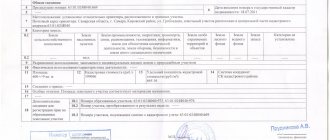General information
Before purchasing a garage, you should take into account all the features of this transaction. For the buyer, the most important thing in this case is that the seller has ownership rights to the property. That is, it must be private property. Of course, buying a garage in a cooperative implies that the owner has the appropriate membership book. But this document does not give the right to a garage.
And if the seller did not have time or was unable to register ownership of the garage, then he will not be able to sell it. In practice, when buying a garage, the future owner turns a blind eye to the lack of title papers. He receives only a GSK membership book in his name, but does not become the owner of the property.
Purchasing a garage using a membership book. there are questions.
Garage in GSK, sold with a membership book. I understand and realize that buying a garage, registered as a property, will deprive me of unnecessary headaches, but in this case this is not yet possible.
It's great that you realize. It is unknown whether this garage has an owner at all or whether it is a self-built building. Accordingly, you will never formally formalize ownership of this garage and it will not be officially inherited. You will only use it in the garage for as long as you need it. And you missed the most important thing - the land under the garage. When real estate is sold, it is sold together with the land. In your case, after the purchase, paying money for the garage and the garage will not be yours and the right to the land will not arise.
How to conduct a purchase/sale transaction correctly so that no pitfalls arise later?
this real estate purchase and sale transaction will not be legal, because The seller does not have ownership of the garage. You yourself wrote “I understand and realize that buying a garage, registered as a property, deprives me of unnecessary headaches, but in this case this is not yet possible.” Only its owner has the right to alienate property. In your case, the so-called seller is not the owner. Most likely, just like you, he acquired this garage unofficially and is now selling it to you.
Your risk from the acquisition, if you can call it that, is that on the basis of this fake agreement you will not have ownership rights to either the land or the garage. Subsequently, through the court, you will not acquire ownership of these objects, but you will pay money. 2 years of your search is not worth a garage that will not be your property. Please think 100, no 1000 times!!!
But if you decide, then you can conclude this agreement in any form, even verbally, because this is a fake, not an agreement. There can be no mandatory requirements for such documents. You yourself realize this.
Spouse's consent is not required
you are wrong to conclude a contract for the sale and purchase of real estate, the notarial consent of the spouse is required, see Part 3 of Art.
35 of the Family Code of the Russian Federation. But the “garage purchase and sale agreement” discussed in this topic from a person who is not the owner will not be subject to state registration. registration, therefore, the notarial consent of the spouse will not be required, since the buyer will not have ownership rights under this agreement. Modified on 05/12/2016 07:00 by East
Privatization
For the transaction to be legal, the buyer must demand that the seller privatize the property in the garage cooperative. And he needs to complete the paperwork. To register a garage in GSK in his name, the seller must submit the following papers:
- passport,
- a certificate stating that the share has been repaid in full,
- cadastral passport,
- certificate of payment of state duty.
Ownership rights are registered in Rosreestr. After receiving the relevant document, the parties can enter into a deal. It’s another matter if not a single garage in this cooperative has been privatized. Then the question arises about what additional documents may be required.
From physical the registration authority will request:
- Charter of the cooperative,
- extract from the tax office,
- decision on choosing a chairman,
- building permit,
- permission to use land,
- documents certifying the commissioning of these facilities.
After submitting all the necessary papers and receiving a certificate of ownership, the garage will be ready for sale.
Entry fee to a garage cooperative when purchasing a garage
quote: Originally posted by Nikodim1: Is it necessary to pay an entrance fee to a garage cooperative if a privatized garage is purchased and the buyer is the owner of the garage and not a member of the cooperative?
If you join a cooperative, then definitely. But as far as I understand, you do not plan to take part in the activities of the cooperative (going to meetings, electing a board, etc.). Then don't. Despite the fact that the land plot (access roads, etc.) is leased by the cooperative, they do not have the right to prohibit access to the garage. But they can cut off the electricity completely. This is perhaps the only thing they can really do.
Documentation
Before buying a garage in a cooperative, an individual. the person must verify the availability and authenticity of all documents necessary for the transaction. Registration of the purchase of a privatized garage is carried out in the same way as the purchase of any other property.
Therefore, the seller is obliged to provide:
- Personal documents (passport).
- Title papers.
- A document indicating the cadastral value of the property.
- Cadastral plan.
- Papers from BTI.
This is a standard package of documents. But under appropriate circumstances, the parties may require additional paperwork. These include:
- Consent to the transaction of the co-owner. Must be certified by a notary.
- General power of attorney (if the transaction is carried out by a representative).
- Consent of the guardianship authority (if one of the garage owners is a minor).
If the seller does not have at least one of these documents, the sale of real estate may be declared illegal by the court.
Garage cooperative dues
Material and monetary resources, all administrative and economic activities of the group of companies are necessarily subject to inspections by a special body - the audit commission, which monitors all the details of the functioning of the cooperative. And in case of controversial situations, it is the information provided by the auditors that will help to understand controversial situations.
Calculations and justifications for all payments are established by the initiative group when creating the charter, and amendments are introduced through a council with the participation of all members of the organization. But there may be differences depending on the features of the management of the GSK; they are recorded in the constituent documents.
This is interesting: How long can you be sick per year on sick leave?
Contract of sale
The next step to purchasing a garage after checking the documents is to draw up a purchase and sale agreement. You can issue a DCP from a notary, although this is not necessary. If the parties decide not to contact a lawyer, a suitable sample document can be found on the Internet.
The main thing is to take into account all the rules by which such agreements are drawn up. If any point is missing, the parties will have to resolve the conflict in court. Therefore, the DCP must indicate:
- Place and date of compilation.
- Your personal data. We are talking not only about passport data, but also about contact numbers, actual place of residence, etc. If a cooperative garage has several owners, then their personal information is indicated. This also applies to the representative if the transaction is carried out by proxy.
- Description of the property. Area, number, location, etc.
- Price. You should write down not only the amount agreed upon by the parties, but also the cadastral value of the plot and garage.
- Conditions for transferring money. This can be cash or non-cash payment, installments, etc.
- Rights and obligations.
- Conditions for termination of the agreement.
- Signatures of the parties.
Knowing how to draw up a contract correctly, you can avoid a lot of problems in the future. For example, there is no need to deliberately underestimate the price of real estate, since the buyer will have a real opportunity to save money and not pay the previously agreed amount. The seller will not be able to prove the verbal terms of the transaction.
Participants can also draw up an act of acceptance and transfer of property. This document is needed to confirm the actual transfer of the cooperative garage from one owner to another. But the law does not require mandatory execution of the act, so the parties can indicate the necessary additional information in the DCP.
Topic: about contributions to a garage cooperative
Sergey, ask the governor to pay this amount. Maybe your father has a debt on contributions, this is a separate topic. Well, it can’t be that joining the Cheka costs 4 rubles. Read the Charter, it should state how many people pay to join the Cheka.
And the treasurer himself must accept the money and make reports on the financial transactions he has carried out. And then report to the chairman. According to the accounting policy of the organization, GSK does not have the right to keep cash in the cooperative’s cash register of more than the approved limit. This is usually 20-30 thousand rubles, the money must be regularly deposited in the bank. If in doubt, you can periodically (once a quarter) check the cash register with the removal of balances and check with the funds in the current account.
This is interesting: Benefits for a labor veteran up to 60 years of age
What does garage privatization give in practice?
Garages that were built during the Soviet Union, in the vast majority of cases, were not registered as the private property of certain citizens. In this regard, the only possible option to correct this situation today is the privatization of this property.
Recently, an increase in the number of cars has significantly increased the demand for the purchase of garage boxes, and therefore they have become quite profitable real estate, which can be rented out or sold at any time, but in order to carry out such transactions in accordance with current legislation, it will be necessary to order to become the legal owner.
According to the law, the procedure for privatizing a garage box is not classified as mandatory, but only after a person is officially registered as the owner will he be able to dispose of the property entirely at his own discretion, that is:
- rent out;
- leave as an inheritance;
- sell;
- present;
- exchange.
In addition, we should not forget that the lack of privatization of the garage may ultimately result in a number of significant problems for the actual owner. First of all, if the object is not located on the territory of a certain specialized cooperative, government officials may declare it illegal, as a result of which it will simply be demolished without any compensation.
The territory that is located under the garage may be needed at any time by a government agency for the implementation of certain goals, and therefore they demolish all the buildings on it, compensating their owners for the appropriate amount. At the same time, if a person, according to documents, is not the rightful owner of the garage box, after its demolition there is no need to expect any compensation.
Any transactions that are carried out with non-privatized property will be considered illegal, regardless of what documents were drawn up for them.
Privatization, in principle, is not necessary if the garage is located on territory owned by a certain citizen and originally intended for gardening.
There is also no need to privatize any portable or collapsible structures, since in accordance with current legislation they do not belong to the category of real estate.
What to do if privatization is refused?
The administration has the right to refuse privatization on the grounds specified in the law. Land cannot be privatized:
- water and forest resources;
- common use;
- for government needs;
- not owned by a municipality or state.
In other cases, the refusal can be challenged in court.
Privatization and registration may be refused if:
- there are factual and spelling errors in the submitted documents;
- there are typos in the cadastral documentation;
- incorrect information about the owner of the property is provided;
- payment of the fee was not made by the applicant.
An application for transfer of a plot through privatization is considered within a month. The decision is provided in writing. In case of refusal, the reasons are indicated. If you disagree with the administration's decision, the applicant has the right to appeal it.
A court decision is necessary in two cases:
- appealing the administration's decision;
- legalization of unauthorized construction.
If the stated requirements are satisfied, registration of property rights is carried out on the basis of a judicial act that has entered into legal force.
See also: What is vindication. Vindication claim
What documents are needed to privatize a garage?
The list of documents that will need to be collected step by step is quite impressive. Therefore, the collection of documentation and its submission to the appropriate authorities is often entrusted to a professional lawyer acting on the basis of an agreement with a client (group of clients) and a power of attorney. But you can go through all the steps yourself, guided by the following instructions:
- Contact the chairman of the GSK and receive a certificate indicating the state registration data of the GSK.
- Submit a certificate to the BTI to receive a certificate with the garage address, and also order a technical plan.
- Contact Rosreestr to order a cadastral passport.
- With a cadastral passport and technical plan, you can submit an application for privatization to Rosreestr.
If all submitted documents are prepared correctly, then within a month you can receive an extract from the Unified State Register of Registered Ownership of the garage. You can speed up the process at the registration chamber, which provides a service for checking submitted documents. When submitting a package of documents to Rosreestr, in addition to the cadastral passport and technical plan, you must provide the following papers:
- Statement.
- A copy of the applicant's passport.
- A certificate issued by the chairman of the State Joint Stock Company, indicating that you have fully repaid your share.
- Founding agreement of GSK.
- Certificate from the Federal Tax Service on the registration of this GSK for tax purposes.
- Certificate of state registration of GSK.
- GSK Charter.
- A document that indicates who is the chairman of the GSK and on what basis (minutes of the general meeting).
- Lease agreement for a land plot for GSK, concluded with the municipality.
- Permission to put the garage complex into operation.
- List of members of the GSK.
- Extract from the Unified State Register of Legal Entities indicating the GSK number.
- Receipt for payment of state duty.
This is the procedure in general terms, but in practice there are many nuances that significantly affect the procedure, complexity and cost of privatization. In particular, it matters when exactly the cooperative was built, on what basis the land for construction was obtained, whether a construction permit was obtained, whether the cooperative purchased the site from the municipality as a legal entity and a number of other nuances.










